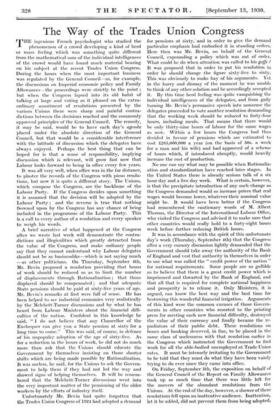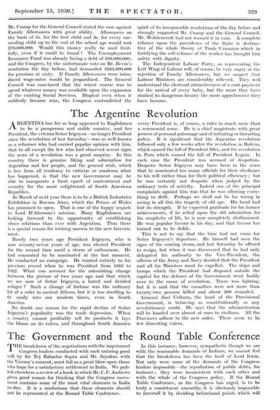The Way of the Trades Union Congress
THE ingenious French psychologist who studied the phenomenon of a crowd developing a kind of herd or mass feeling which was something quite different from the mathematical sum of the individual intelligences of the crowd would have found much material bearing on his subject at the recent Trades Union Congress. During the hours when the most important business was regulated by the General Councilâas, for example, the discussions on Imperial economic policy and Family Allowancesâthe proceedings were strictly to the point ; but when the Congress lapsed into its old habit of talking at large and voting as it pleased on the extra- ordinary assortment of resolutions presented by the various Unions there were sharp and painful contra- dictions between the decisions reached and the commonly approved principles of the General Council. The remedy, it may be said, would be to have each day's agenda placed under the absolute direction of the General Council, but that would be a considerable interference with the latitude of discussion which the delegates have always enjoyed. Perhaps the best thing that can be hoped for is that a sense of responsibility, implying discuSsion which is relevant, will grow fast now that Labour looks forward to being in office every few years.
It was all very well, when office was in the far distance, to plaster the records of the Congress with pious resolu- tions, but now it is quite a different story. The Unions, which compose the Congress, are the backbone of the Labour Party. If the Congress decides upon something it is assumed that the decision will be adopted by the Labour Party ; and the reverse is true that nothing frowned upon by the Congress has any chance of being included in the programme of the Labour Party. This is a call to every author of a resolution and every speaker to weigh his words.
A brief narrative of what happened at the Congress after we wrote last week will demonstrate the contra- dictions and illogicalities which greatly detracted from the value of the Congress, and make ordinary people say that they cannot understand why Labour delegates should not be as businesslikeâwhich is not saying much âas other politicians. On Thursday, September 4th, Mr. Bevin proposed a resolution providing that hours of work should be reduced so as to limit the number of displacements through Rationalization ; that those displaced should be compensated ; and that adequate State pensions should be paid at sixty-five years of age. Mr. Bevin's remarks at first were full of sense. He has been helped to see industrial economics very realistically by the Melchett-Turner discussions and by what he has heard from Labour Ministers about the financial diffi- culties of the nation. Confident in this knowledge he said, " I do not believe that any Chancellor of the Exchequer can give you a State pension at sixty for a long time to come." This was said, of course, in defence of his unpopulr: adoption of the age of sixty-five. As for a reduction in the hours of -work, he did not do much more than ask that the Unions should educate the Government by themselves insisting on those shorter shifts which are being made possible by Rationalization. It was useless, he said, for the Unions to ask the Govern- ment to help them if they had not led the way and showed signs of helping themselves. It will be remem- bered that the Melchett-Turner discussions went into the very important matter of the pensioning of the older workers by the efforts of industry itself.
Unfortunately Mr. Bevin had quite forgotten that the Trades Union Congress of 1924 had adopted a demand for pensions at sixty,\ and in order to give the demand particular emphasis had, embodied it in- standing orders. Here then was Mr. Bevin, on behalf of the General Council, expounding a policy which was out of order. What could he do when attention was called to his gaffe ? It was proposed that in order to put his resolution in order he should change the figure sixty-five to sixty. This was obviously to make hay of his arguments. Yet in the hurry and dismay of the moment he was unable to think of any other solution and he accordingly accepted it. By this time herd feeling was quite vanquishing the individual intelligences of the delegates, and from gaily turning Mr. Bevin's persuasive speech into nonsense the delegates proceeded to vote another resolution demanding that the working week should be reduced to forty-four hours, including meals. That means that there would be only thirty-nine hours of labour for the same wages as now. Within a few hours the Congress had thus decided in favour of pensions which are estimated to cost ÂŁ285,060,000 a year (on the basis of 50s. a week for a man and his wife) and had approved of a scheme of hours which, if introduced abruptly, would heavily increase the cost of production.
No one can say what may be possible when Rationalize ation and standardization have reached later stages. In the United States there is already serious talk of a six hour day and a five day week. What is certain, however, is that the precipitate introduction of any such change as the Congress demanded would so increase prices that real wages would become lower, whatever their nominal value might be. It would have been better if the Congress had remembered the cautionary words of M. Albert Thomas, the Director of the International Labour Office, who visited the Congress and advised it to make sure that other countries would really hold to a forty-eight hours week before further reducing British hours.
It was in accordance with the spirit of this unfortunate day's work (Thursday, September 4th) that the Congress after a very cursory discussion lightly demanded that the Government should take away the authority of the Bank of England and vest that authority in themselves in order to use what was called the " credit power of the nation " for national requirements. Some people are so gullible as to believe that there is a great credit power which is imprisoned and thwarted by the Bank of England, and that all that is required for complete national happiness and prosperity is to release it. Only Ministers, it is argued, can know the best way and the best time for bestowing this wonderful financial irrigation. Arguments of this kind were the common excuses of those Govern- ments in other countries who resorted to the printing press for meeting each new financial difficulty, destroyed the value of their currency and finally became the re- pudiators of their public debt. These resolutions on hours and banking deserved, in fine,' to be placed in the same class of uselessness with that resolution earlier in the Congress which instructed the Government to find work for all the able-bodied unemployed at Trade Union rates. It must be intensely irritating to the Government to be told that they must do what they have been vainly trying to do ever- since they came into office. On Friday, September 5th, the exposition on behalf of the General Council of the Report on Family Allowances took up so much time that there was little left for the -movers of the abundant resolutions from the Unions. At the end of the day, however, a shower of these resolutions fell upon an inattentive audience. Inattention, let it be added, did not prevent them from being adopted;











































 Previous page
Previous page